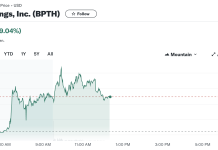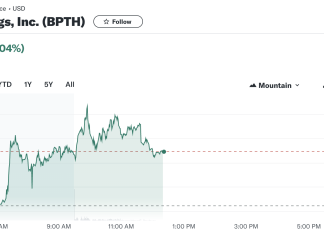Aprea Therapeutics Inc. (NASDAQ: APRE) has presented data from its Phase I/II clinical trial in advanced tumors at the European Society of Medical Oncology (ESMO). The study evaluated the efficacy and safety of eprenetapo and pembrolizumab.
The study enrolled 33 patients
Thirty-three participants had been enrolled in the study as of July 31, 2021, with 31 having started treatment. There were no dose-limiting toxicities recorded in the six enrolled patients during the Phase I safety lead-in stage, which had a dose de-escalation design. The company commenced a Phase II expansion phase, and three patients in the gastric/GEJ cancer, three in the urothelial/bladder cancer, and 19 in the non-small cell lung cancer (NSCLC) groups had been enrolled as of the data cutoff. Prior exposure to a PD-1 or PD-L1 inhibitor was required for NSCLC Phase II group patients. A mutation in the TP53 gene was found in 25 (76%) of the patients.
At the first response assessment at nine weeks, one patient with locally progressed TP53 mutant high-grade transitional cell bladder cancer had achieved complete remission (CR) by RECIST criteria in the bladder/urothelial cohort. In addition, at the initial response assessment at nine weeks, two patients with TP53 mutant squamous NSCLC achieved decreases in target lesions of 26.7% and 8.2%, respectively, from baseline, according to RECIST criteria.
Tumor reduction witnessed in lung cancer.
Washington University in St. Louis’s Dr. Haeseong Park said, “The emerging data for the combination of eprenetapopt and pembrolizumab in these difficult-to-treat patients is very encouraging. Particularly promising are tumor reductions in lung cancer patients who previously received I/O therapy, and the complete remission in a bladder cancer patient with prior chemotherapy exposure, which is rare. In addition, the clinical experience to-date suggests the combination is well-tolerated with adverse events readily managed with standard of care measures. The other investigators and I look forward to maturation of the data from this clinical trial as we seek to enroll and treat additional patients with this novel combination.”















